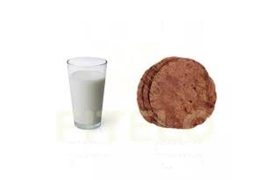Bread is a staple food consumed worldwide and comes in various forms, including whole grain, white, and artisanal bread. It is made from flour, water, yeast, and salt, and can be enriched with additional ingredients like seeds, nuts, or sweeteners. Bread provides carbohydrates, which are a primary source of energy, as well as fiber, vitamins, and minerals depending on the type of flour used.
While whole grain breads offer more nutrients and fiber, white bread is often less nutritious due to the removal of the bran and germ during processing. Despite its popularity, some people may have gluten intolerance or sensitivities, leading to adverse reactions. Overall, bread can be part of a healthy diet when consumed in moderation and as part of a balanced meal plan.
1. Multigrain Bread:
Multigrain bread contains a variety of grains, which can include wheat, oats, barley, and seeds. While it can be a good source of fiber and various nutrients, not all multigrain bread is made with whole grains. Some varieties may still contain refined grains, so it’s essential to check the ingredient list and choose options labeled as “whole grain” or “100% whole wheat” for the highest nutritional value.
Multigrain Bread (1 slice, approximately 28 grams):
- Calories: Around 70-80 kcal
- Protein: 2-3 grams
- Carbohydrates: 12-14 grams
- Fiber: 2-3 grams
- Fat: 1-2 grams
- Micronutrients: Varies depending on the specific grains and seeds used, but multigrain bread can provide small amounts of vitamins and minerals such as iron, magnesium, and B vitamins.
2. Brown (Whole Wheat) Bread:
Brown bread, often referred to as whole wheat bread, is made from whole wheat flour, which retains the entire grain kernel, including the bran, germ, and endosperm. This means it’s higher in fiber, vitamins, minerals, and phytonutrients compared to refined white bread. Whole wheat bread is typically recommended for its health benefits, including improved digestion, heart health, and blood sugar control.
Whole Wheat (Brown) Bread (1 slice, approximately 28 grams):
- Calories: Around 70-80 kcal
- Protein: 3-4 grams
- Carbohydrates: 12-14 grams
- Fiber: 2-3 grams
- Fat: 1-2 grams
- Micronutrients: Whole wheat bread is a good source of nutrients such as fiber, B vitamins (including folate), iron, magnesium, and selenium.
3. White Bread:
White bread is made from refined grains, where the bran and germ are removed during processing, leaving only the starchy endosperm. As a result, white bread is lower in fiber and nutrients compared to whole wheat and multigrain bread. It also tends to have a higher glycemic index, which can lead to spikes in blood sugar levels.
White Bread (1 slice, approximately 28 grams):
- Calories: Around 70-80 kcal
- Protein: 2-3 grams
- Carbohydrates: 12-14 grams
- Fiber: 0-1 gram (typically low or no fiber)
- Fat: 0-1 gram
- Micronutrients: White bread is generally lower in nutrients compared to whole wheat and multigrain bread. It may contain small amounts of iron and B vitamins if enriched.
In summary, both multigrain and whole wheat bread are generally considered healthier choices compared to white bread due to their higher fiber and nutrient content. However, it’s essential to look for options made with whole grains to maximize their nutritional benefits. When choosing bread, prioritize those labeled as “whole grain” or “100% whole wheat” to ensure you’re getting the most nutrients and health benefits.
Overall, multigrain and whole wheat (brown) bread tend to be higher in fiber and nutrients compared to white bread. They provide more sustained energy due to their fiber content and offer a broader range of vitamins and minerals. Additionally, the fiber in whole wheat and multigrain bread can aid digestion, promote satiety, and help regulate blood sugar levels. When choosing bread, opt for whole grain varieties to maximize nutritional benefits.
Disclaimer:
The information contained in this article is for educational and informational purposes only and is not intended as a health advice. We would ask you to consult a qualified professional or medical expert to gain additional knowledge before you choose to consume any product or perform any exercise.








